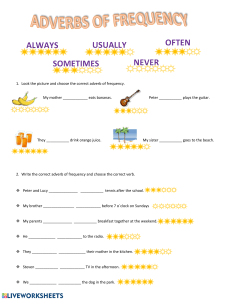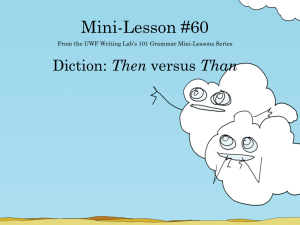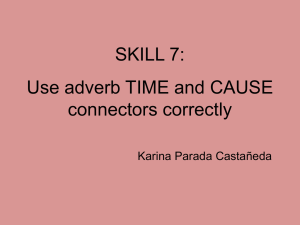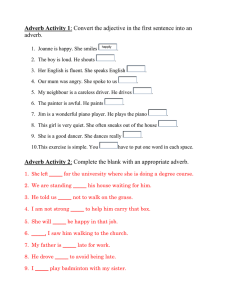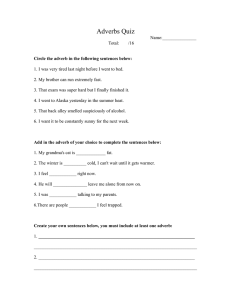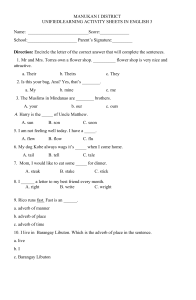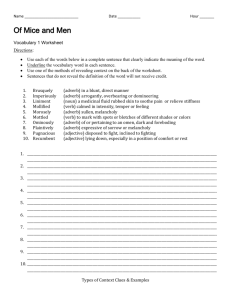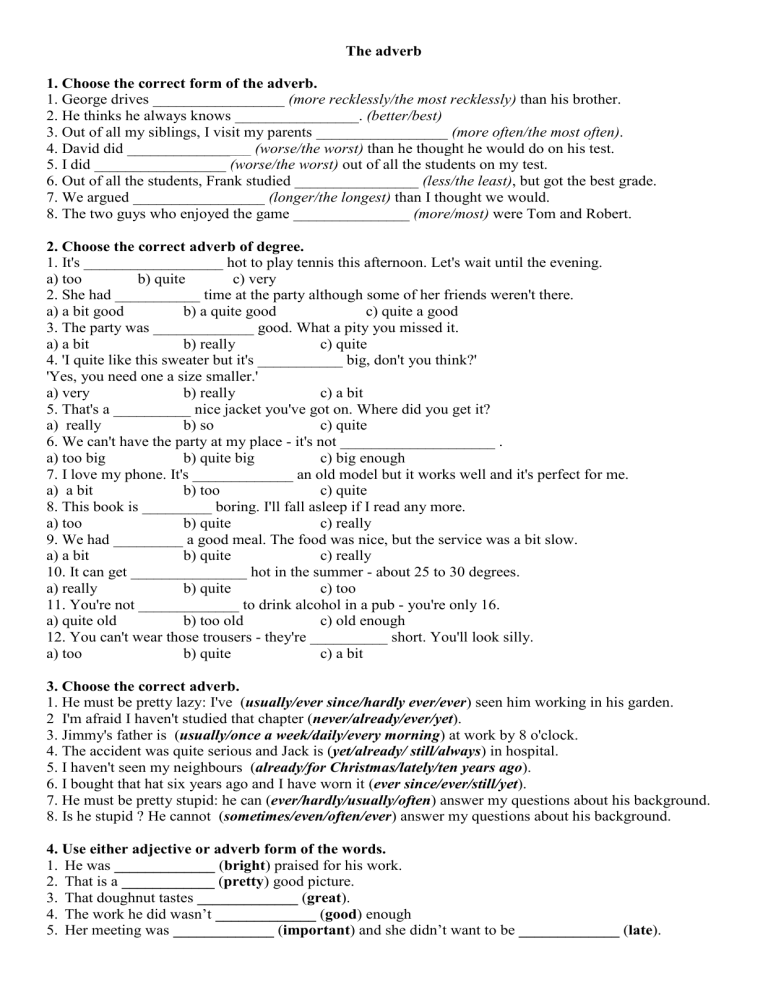
The adverb 1. Choose the correct form of the adverb. 1. George drives _________________ (more recklessly/the most recklessly) than his brother. 2. He thinks he always knows ________________. (better/best) 3. Out of all my siblings, I visit my parents _________________ (more often/the most often). 4. David did ________________ (worse/the worst) than he thought he would do on his test. 5. I did _________________ (worse/the worst) out of all the students on my test. 6. Out of all the students, Frank studied ________________ (less/the least), but got the best grade. 7. We argued _________________ (longer/the longest) than I thought we would. 8. The two guys who enjoyed the game _______________ (more/most) were Tom and Robert. 2. Choose the correct adverb of degree. 1. It's __________________ hot to play tennis this afternoon. Let's wait until the evening. a) too b) quite c) very 2. She had ___________ time at the party although some of her friends weren't there. a) a bit good b) a quite good c) quite a good 3. The party was _____________ good. What a pity you missed it. a) a bit b) really c) quite 4. 'I quite like this sweater but it's ___________ big, don't you think?' 'Yes, you need one a size smaller.' a) very b) really c) a bit 5. That's a __________ nice jacket you've got on. Where did you get it? a) really b) so c) quite 6. We can't have the party at my place - it's not ____________________ . a) too big b) quite big c) big enough 7. I love my phone. It's _____________ an old model but it works well and it's perfect for me. a) a bit b) too c) quite 8. This book is _________ boring. I'll fall asleep if I read any more. a) too b) quite c) really 9. We had _________ a good meal. The food was nice, but the service was a bit slow. a) a bit b) quite c) really 10. It can get _______________ hot in the summer - about 25 to 30 degrees. a) really b) quite c) too 11. You're not _____________ to drink alcohol in a pub - you're only 16. a) quite old b) too old c) old enough 12. You can't wear those trousers - they're __________ short. You'll look silly. a) too b) quite c) a bit 3. Choose the correct adverb. 1. He must be pretty lazy: I've (usually/ever since/hardly ever/ever) seen him working in his garden. 2 I'm afraid I haven't studied that chapter (never/already/ever/yet). 3. Jimmy's father is (usually/once a week/daily/every morning) at work by 8 o'clock. 4. The accident was quite serious and Jack is (yet/already/ still/always) in hospital. 5. I haven't seen my neighbours (already/for Christmas/lately/ten years ago). 6. I bought that hat six years ago and I have worn it (ever since/ever/still/yet). 7. He must be pretty stupid: he can (ever/hardly/usually/often) answer my questions about his background. 8. Is he stupid ? He cannot (sometimes/even/often/ever) answer my questions about his background. 4. Use either adjective or adverb form of the words. 1. He was _____________ (bright) praised for his work. 2. That is a ____________ (pretty) good picture. 3. That doughnut tastes _____________ (great). 4. The work he did wasn’t _____________ (good) enough 5. Her meeting was _____________ (important) and she didn’t want to be _____________ (late). 6. The entrance exam he took was ______________ (extreme) difficult. 7. Please tell Dad to drive _____________ (careful). The roads are ____________ (icy) and the winds are blowing ____________ (heavy). 8. Have you seen George _____________ (late) . - No I haven't seen him at all _____________ (recent). 9. Bertha cried _______________ (silent) in her bed last night. 10. My brother is a _______________ (wonderful) cook. Nobody makes roast beef like he does. He says it's ______________ (typical) British. 5. Choose the correct form. 1. We have not worked too (hard/hardly) (late/lately). 2. What's wrong with this meal . It looks (fine/finely) to me. 3. She wiped the floor (clean/cleanly). 4. Mother grew (calm/calmly) after she heard the (good/well) news. 5. The tiger (near/nearly) came too (near/nearly) for comfort. 6. The dancer moved (incredible/incredibly) (graceful/gracefully). 7. Credit cards are (wide/widely) accepted nowadays. 8. The job was done (professional/professionally). 9. The goulash was (high/highly) seasoned. 10. They were (perfect/perfectly) (happy/happily) about their Christmas presents 11. We (hard/hardly) noticed the storm. 12. We don't take him (serious/seriously). 6. Choose the correct alternative. 1. You need to work harder; ________________, you'll get fired. a) otherwise b) moreover c) instead 2. We wanted to go to Portugal; ________________, we went to Brazil. a) instead b) accordingly c) otherwise 3. He is a very weak president; ________________, most people support him. a) otherwise b) instead c) nevertheless 4. We wanted to go to the beach; ________________, it started to rain and we stayed at home. a) otherwise b) however c) namely 5. She is a very smart woman; ________________, it is not at all surprising that she got the job. a) nevertheless b) similarly c) therefore 6. John has very little money; ________________, his brother Jacob is a millionaire. a) in contrast b) nonetheless c) similarly 7. He tried his best; ________________, he couldn't pass the exam. a) still b) otherwise c) subsequently 8. I totally disagree with his interpretation; ________________, he's no authority on the subject. a) then b) besides c) nevertheless 9. James finished his degree at Oxford University; ________________, he settled in London and took up a position with a large international bank. a) instead b) also c) subsequently
